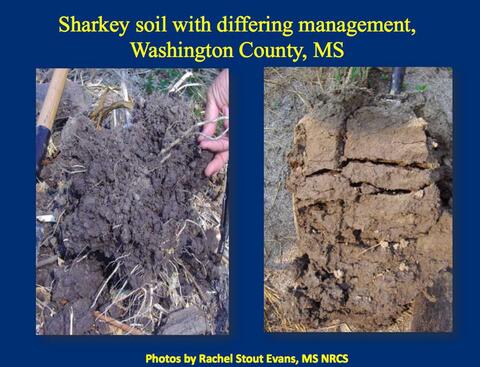Soil Health

Healthy soils function as a vital, living ecosystem to sustain plants, animals, and humans. Maintaining and building healthy soils is the foundation of farming systems to supply food and fiber to the world.
Soils provide plants with mineral nutrition, water storage, and physical support for growth. Soils maintain the quality of air and water. Ultimately, soils support life.
Many biological, chemical, and physical processes interact to develop the variety of soils on today’s landscape. Soils differ across landscapes because five factors come together in any location:
- parent material,
- local biology,
- topography,
- climate, and
- time.
Healthy soils provide a multitude of services that simultaneously benefit agriculture and the environment. Moreover, healthy soils benefit all farmers, from small vegetable gardeners to large row-crop operations. Healthy soils offer many benefits:
- Enhanced organic matter and soil organisms improve soil structure, aeration, water retention, drainage, and nutrient availability for plant growth.
- Reduced tillage and efficient fertilizer use reduce expenses.
- Soils protect natural resources.
- Increased soil cover year-round can sequester carbon from the air and store it in the soil, benefitting air quality, soil health, and wildlife and plant diversity.
- Increased organic matter enables soil to hold more water and reduce runoff.
- Favorable soil water retention, combined with nutrient management practices, prevents nutrients from contaminating water bodies, thereby protecting water resources and aquatic habitats.
- Reducing trips across fields reduces emissions and improves air quality.
Healthy soil is important for continued food and fiber production. However, building and maintaining soil health, particularly organic matter, requires management commitment and execution.
Here are steps to follow when developing a management plan:
- Develop the farm strategic plan, including personal life goals.
- Develop the business plan.
- Use Web Soil Survey to learn your soils intimately.
- Educate yourself on crops and their markets.
- Educate yourself on the “hows” of crops and conservation practices.Develop and follow a conservation plan that includes a nutrient management plan, based on current soil-testing data from a reputable laboratory. Follow it.
- Develop and follow a budget, and track the budget performance with monthly, quarterly, and annual accounting.Get the work done.
- Stay informed so you can ask the hard questions of “experts.”
- Evaluate after a crop year and go back to Web Soil Survey and study your soils again.
What we see as soil health is an intersection of biology, chemistry, and physics. While measuring properties such as soil organic matter (and thus soil carbon), pH, and plant nutrient status is straightforward, measuring soil health is challenging and the subject of much current research.
Innovative practices that promote soil health while supporting economic and environmental sustainability are featured in the /node/10583 program.
The REACH publication http://extension.msstate.edu/publications/natural-resource-conservation-agriculture was used to develop the current information.
A variety of soil health resources are online:
https://www.nrcs.usda.gov/wps/portal/nrcs/main/soils/health/
https://www.sare.org/resources/what-is-soil-health/
https://soilhealthinstitute.org/
https://www.soilhealthpartnership.org/
The Mississippi State University Extension Service offers many helpful publications on a variety of topics:
Overall Nutrient Management and Fertilizers
Nutrient Management Guidelines for Agronomic Crops Grown in Mississippi
Soil Testing for the Homeowner
Soil and Broiler Litter Testing Basics
Nutrient Management Planning Basics
Inorganic Fertilizers For Crop Production
Urea-based Fertilizers in Forage Production
Interpreting Soil Testing Laboratory Results for Vegetable Crops
Soil Nutrients
Potassium in Mississippi Soils
Phosphorus in Mississippi Soils